|
|
|
Sort Order |
|
|
|
Items / Page
|
|
|
|
|
|
|
| Srl | Item |
| 1 |
ID:
105249
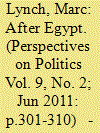

|
|
|
|
|
| Publication |
2011.
|
| Summary/Abstract |
The uprisings which swept across the Arab world beginning in December 2010 pose a serious challenge to many of the core findings of the political science literature focused on the durability of the authoritarian Middle Eastern state. The impact of social media on contentious politics represents one of the many areas which will require significant new thinking. The dramatic change in the information environment over the last decade has changed individual competencies, the ability to organize for collective action, and the transmission of information from the local to the international level. It has also strengthened some of the core competencies of authoritarian states even as it has undermined others. The long term evolution of a new kind of public sphere may matter more than immediate political outcomes, however. Rigorous testing of competing hypotheses about the impact of the new social media will require not only conceptual development but also the use of new kinds of data analysis not traditionally adopted in Middle East area studies.
|
|
|
|
|
|
|
|
|
|
|
|
|
|
|
|
| 2 |
ID:
068939
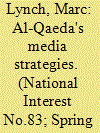

|
|
|
| 3 |
ID:
118443
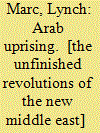

|
|
|
|
|
| Publication |
New York, Public Affairs, 2012.
|
| Description |
269p.hbk
|
| Standard Number |
978610390842
|
|
|
|
|
|
|
|
|
|
|
|
Copies: C:1/I:0,R:0,Q:0
Circulation
| Accession# | Call# | Current Location | Status | Policy | Location |
| 057080 | 956.054/LYN 057080 | Main | On Shelf | General | |
|
|
|
|
| 4 |
ID:
150973
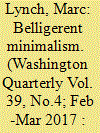

|
|
|
|
|
| Summary/Abstract |
Donald J. Trump's election as the next President of the United States has thrown enormous doubt upon the continuity of American policy around the world. For the Middle East, Trump did not articulate a coherent policy during the campaign, but he has generally been highly critical of the Obama administration's management of the region. Trump's campaign sharply criticized the nuclear agreement with Iran, opposed intervention on behalf of rebels in Syria, criticized allies such as Saudi Arabia, and called for a ban on Muslim immigration to the United States.
|
|
|
|
|
|
|
|
|
|
|
|
|
|
|
|
| 5 |
ID:
110320
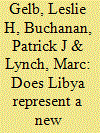

|
|
|
|
|
| Publication |
2012.
|
| Summary/Abstract |
In the last issue of The National Interest, we ran a cover story by Nikolas K. Gvosdev and Ray Takeyh positing that America's military role in helping bring down Libyan president Muammar el-Qaddafi represented a significant new era in the country's foreign policy-the ascendancy of a doctrine that placed far greater emphasis on humanitarian considerations as a rationale for military interventions overseas. This was a provocative thesis, and the authors' probing analysis and tight argumentation rendered it one that we were proud to display prominently in our journal. But it occurred to us that it certainly didn't represent the last word on the subject of the future of American foreign policy. And so we invited three prominent international-relations thinkers-Leslie H. Gelb, Patrick J. Buchanan and Marc Lynch-to weigh in with their own thoughts on the subject. Their musings follow, along with a final response from Gvosdev and Takeyh, who get the last word as a reward for introducing the subject in the first place.
|
|
|
|
|
|
|
|
|
|
|
|
|
|
|
|
| 6 |
ID:
186790
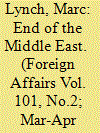

|
|
|
| 7 |
ID:
104076
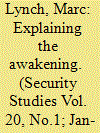

|
|
|
|
|
| Publication |
2011.
|
| Summary/Abstract |
This article explores the reasons for the dramatic change in Sunni Arab Iraqi attitudes toward the United States from 2004 to 2007, which made possible the "Awakenings," local groups of mostly Sunni tribes and former insurgents that decided to cooperate with the United States against al Qaeda in Iraq. While there have been many studies of the military strategy, there has been little attention paid to the reasons for the underlying attitude change. This article argues that the dramatic changes in the information environment and in the nature of direct contacts across a range of Sunni society played a crucial role. It draws on a wide range of Arabic language primary sources that have generally been neglected in U.S. military-centric accounts. No single dialogue flipped the Sunnis, and the change would not likely have happened without the material changes underpinning their interests. But years of ongoing, intensive dialogues across a wide range of interlocutors reshaped the foundations of the relationship and to convince those involved individuals of the possibility of a strategic shift. American counterinsurgency (COIN) doctrine and the surge helped by proliferating the points of contact with Iraqis and by transforming the relations at the individual level. This has broad implications for key debates in contemporary U.S. foreign policy, as well as for counterinsurgency and international relations (IR) theory.
|
|
|
|
|
|
|
|
|
|
|
|
|
|
|
|
| 8 |
ID:
096557
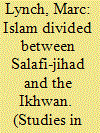

|
|
|
|
|
| Publication |
2010.
|
| Summary/Abstract |
The Muslim Brotherhood poses a unique challenge to efforts to combat Al Qaeda and like-minded groups. It is one of the key sources of Islamist thought and political activism, and plays a significant role in shaping the political and cultural environment in an Islamist direction. At the same time, it opposes Al Qaeda for ideological, organizational, and political reasons and represents one of the major challenges to the salafi-jihadist movement globally. This dual nature of the Muslim Brotherhood has long posed a difficult challenge to efforts to combat violent extremism. Does its non-violent Islamism represent a solution, by capturing Islamists within a relatively moderate organization and stopping their further radicalization (a "firewall"), or is it part of the problem, a "conveyor belt" towards extremism? This article surveys the differences between the two approaches, including their views of an Islamic state, democracy, violence, and takfir, and the significant escalation of those tensions in recent years. It concludes that the MB should be allowed to wage its battles against extremist challengers, but should not be misunderstood as a liberal organization or supported in a short-term convergence of interests.
|
|
|
|
|
|
|
|
|
|
|
|
|
|
|
|
| 9 |
ID:
162380
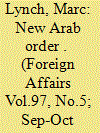

|
|
|
| 10 |
ID:
140525
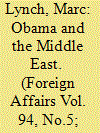

|
|
|
|
|
| Summary/Abstract |
Critics of U.S. President Barack Obama’s Middle East strategy often complain that Obama lacks a strategic vision. This is almost exactly wrong. Obama came to office with a conviction that reducing the United States’ massive military and political investment in the Middle East was a vital national security interest in its own right. The occupation of Iraq and the excesses of the war on terrorism had left the United States overextended, especially at a time of economic crisis. “Rightsizing” the United States’ footprint in the region meant not only reducing its material presence but also exercising restraint diplomatically, stepping back and challenging allies to take greater responsibility for their own security. Obama has adhered consistently to this strategy, prioritizing it ruthlessly along the way and firmly resisting efforts to force it off track. This was not a strategy much beloved in Washington or in a region hard-wired for the exercise of American power. But it was a clear and coherent strategy that led Obama to undertake major initiatives on the problems he viewed as rising to the level of core national security interests: Iran’s nuclear weapons program, terrorism, the Israeli-Palestinian conflict, and the war in Iraq.
|
|
|
|
|
|
|
|
|
|
|
|
|
|
|
|
| 11 |
ID:
142144


|
|
|
|
|
| Summary/Abstract |
Arab politics will be torn for many years to come between the restless, critical power of the public sphere and the determined efforts of regimes, states, and old elites to maintain their domination.” Third in a series on public spheres around the world.
|
|
|
|
|
|
|
|
|
|
|
|
|
|
|
|
| 12 |
ID:
056115
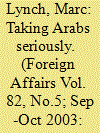

|
|
|
| 13 |
ID:
081340


|
|
|
| 14 |
ID:
130265
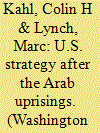

|
|
|
|
|
| Publication |
2013.
|
| Summary/Abstract |
Two years into the wave of upheaval sweeping the Arab world, new regional dynamics have become clearer, as have unresolved tensions in current U.S. policy toward the region. Given the scale and velocity of political turmoil associated with the Arab uprisings, the Obama administration has understandably adopted a largely reactive approach, attempting to adjust U.S. policies to a rapidly changing environment. It has been more successful in those efforts than is commonly recognized, maintaining effective pressure against Iran and al-Qaeda while helping to broker meaningful political transitions in Tunisia, Egypt, Yemen, and Libya. But now there is a sense of drift overtaking American strategy for the region. The time has come for the Obama administration to articulate a more coherent, overarching, positive agenda for the new Middle East.
|
|
|
|
|
|
|
|
|
|
|
|
|
|
|
|
| 15 |
ID:
096495
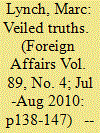

|
|
|
| 16 |
ID:
068105
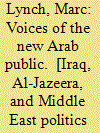

|
|
|
|
|
| Publication |
New York, Columbia University Press, 2006.
|
| Description |
xiv, 293p.
|
| Standard Number |
0231134487
|
|
|
|
|
|
|
|
|
|
|
|
Copies: C:1/I:0,R:0,Q:0
Circulation
| Accession# | Call# | Current Location | Status | Policy | Location |
| 050933 | 306.20917492709051/LYN 050933 | Main | On Shelf | General | |
|
|
|
|
|
|
|
|
|